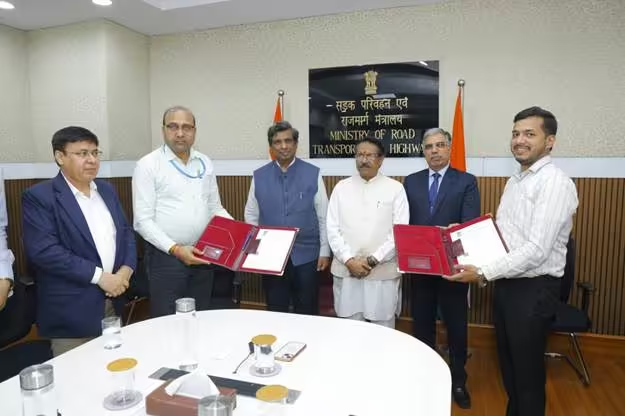
SECI and NHAI signed a MoU to install solar power plants along the Delhi–Saharanpur–Dehradun Highway
SECI and NHAI have signed a landmark MoU to install solar power plants along the Delhi–Saharanpur–Dehradun Highway, aiming to make it cleaner and more sustainable. The agreement was signed in the presence of Minister of State for Corporate Affairs & Road Transport and Highways Shri Harsh Malhotra. Key Highlights of the MoU - Parties involved: Solar Energy Corporation of India Limited (SECI) and National Highways Authority of India (NHAI). - Location: Elevated portion of Package-1 (Delhi Portion) of the Delhi–Saharanpur–Dehradun Highway (NH-709B). - Phase: Implementation begins with Phase-1 of the project. - Objective: Harness solar energy to power highway infrastructure, reduce carbon footprint, and promote sustainable development. - Vision alignment: Supports Prime Minister Narendra Modi’s Net Zero by 2070 goal by integrating renewable energy into transport infrastructure. - Dignitaries present: Shri Harsh Malhotra (Minister of State for Corporate Affairs & Road Transport and Highways), Shri V. Umashankar (Secretary, MoRTH), and Shri Sanjay Sharma (Director, SECI Ltd). Why This Matters - Clean energy generation: Solar plants will directly power highway operations, reducing reliance on fossil fuels. - Model for future projects: This initiative sets a national precedent for integrating renewable energy with highways. - Carbon footprint reduction: Helps cut emissions from one of India’s busiest transport corridors. - Sustainable infrastructure: Demonstrates how highways can evolve into eco-friendly assets while meeting transport needs. Broader Context - The Delhi–Dehradun Expressway (210 km corridor) is expected to open by February 2026, reducing travel time from six hours to under three. - The solarization project complements this expressway by ensuring that the new infrastructure is not only faster but also environmentally responsible. - This collaboration reflects India’s growing push under the Ministry of Road Transport and Highways (MoRTH) to green its road networks. Takeaway This MoU is more than just a renewable energy project—it’s a symbol of India’s transition towards sustainable infrastructure, combining speed, efficiency, and environmental responsibility. The Delhi–Saharanpur–Dehradun Highway will serve as a model corridor for clean energy integration, inspiring similar projects across the country.
